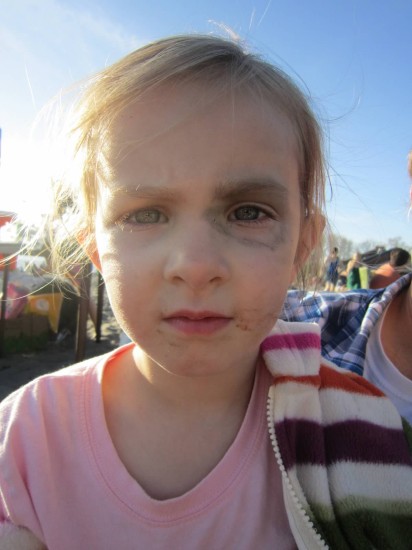My kid is a rule follower. She would rather cut off her leg than be in trouble, wants stories told precisely the same way every time, lives to enforce playground rules, and for most of her toddler years wanted to grow up to be a crossing guard.
This bugs a person like me. I worry that I’m not providing her with opportunities to test boundaries, develop independence, be resourceful, strike out on adventures, make questionable choices, and have the run of our neighborhood. But as a parent raising a five-year-old in a fairly urban environment, I first really need her to stop forgetting to look for cars.
In the meantime, our default is to head to one of the Northwest’s great public parks, beaches, or playgrounds. Yet my worst fears about her stunted opportunities for play were recently reinforced in this stunning accounting of things that are technically illegal for kids to do there.
Like climbing trees, catching frogs, erecting a fort, turning sticks into light sabers, digging a hole, throwing rotten apples, or making a daisy chain.
There are lots of smart ways to make cities more family friendly, from offering incentives for larger housing units to designing public spaces that work for different ages. I’ll be exploring some of those in a series over the next few months. But here’s an easy place to start.
MIG parks planner Cindy Mendoza, in an article written for the winter issue of the Oregon Recreation and Park Association magazine, compiled this astonishing list of activities that are expressly banned in different park jurisdictions around the state:
- Collecting leaves, flowers, and pine cones: No person shall, within a County park, pick, cut, mutilate or remove from any park area flowers, shrubs, foliage, trees or plant life or products of any kind without written permission therefore from the Roads and Parks Department. (Jackson County)
- Collecting rocks or digging holes: No person shall dig up, deface or remove dirt, stones, rock or other substances nor make any excavation on district property. (Bend)
- Throwing rocks: No person shall use airborne projectiles . . . that may harm district property or people on district property, except as authorized by the Director of Parks & Recreation or designee. (La Pine)
- Splashing in creeks: No person shall fish, wade, swim, or bathe in any Park except in the places designated by the Director for such purposes. (Portland)
Princess Frog by misspixels, flickr used under CC CREATIVECOMMONS.ORG licenses
Climbing trees: Do not climb trees or allow children to play in trees. You are responsible for all damage. Be careful because most trees are valued at over $1,000. (Grants Pass)
- Catching bugs: No person shall pursue, trap, kill, injure, or molest any wildlife or domestic animals within a Park, except as may be ordered by the Parks Department. (Klamath County)
- Building forts: No person shall excavate, erect, install, place or perform any action related to the placement of any temporary or permanent structure on District property except for approved temporary placement of personal accessories. (Tualatin Hills)
In other examples, the City of Seattle’s prohibition against “capturing, disturbing or annoying any animal” could arguably rule out chasing butterflies or scooping up fish with a net.
The city of Portland’s ordinance expressly prohibits climbing trees or building any temporary or permanent structure in a park, which means no forts or fairy houses. And the parks code of Pierce County, Washington, states that it is unlawful to “play games and conduct general horseplay on crowded swimming beaches.”
I’m not suggesting that park police will actively prevent children for doing most of these things. But the pocket parks and playgrounds that happen to be most convenient to our house don’t exactly entice my daughter to explore her surroundings or build things or make creative use of available materials.
It’s not a girl thing. My daughter is both fearless and athletic. It’s just that she prefers the monkey bars or a climbing structure to a tree. She begs to watch strangers play baseball or ultimate frisbee at the fields near our house, yet the wilder parts of Woodland Park hold little interest. Despite the countless hours she has spent on river banks indulging my trout fishing habit, she still has trouble figuring out how to entertain herself there.

Muddy Toes by Kristi White used under CC CREATIVECOMMONS.ORG licenses
It’s certainly possible to design urban parks—or at least parts of them—where kids are encouraged to muck stuff up and break the rules that might normally apply to a public space that needs to be maintained. These natural play areas encourage them to climb on boulders, build dams, test their aim, engineer with found materials, and learn how to play without a metal structure telling them what to do.
It’s one small, neighborhood-scale way that cities can make themselves more appealing to families. It’s hardly the most important. We need affordable housing units that are appropriately sized for families, zoning laws that allow builders to design family-friendly courtyard housing, public schools in our downtown corridors, streets that provide a buffer between unsteady toddlers and speeding cars, buses that accommodate strollers, and public spaces that do double duty for parents and their kids.
But to start, we could limit the things that we tell our kids they cannot do (because any parent does enough of that) in the places we’ve expressly set aside for them to play. And to design those urban spaces to help the rule followers navigate a world where there aren’t any.










Kelly Turner
Most of these rules make sense! We can play outdoors without disturbing wildlife or altering the environment, and we need to teach our children to do so. Chasing and capturing any animal is rude, at best, and potentially harmful. Building dams in creeks alters flow, adds sediment, disturbs fish and other creatures, and models a human-centric behavior that must change.
This article, on Earth Day, is way off the mark.
Jennifer Langston
Kelly – Obviously, sensitive natural areas need limits. But there’s no need to extend those rules to all play areas, and most of the parks we visit are already pretty developed. I would also argue that there’s a difference between excavating or trampling a streambank and pretty harmless (yet still illegal) activities like having a pine cone war or climbing a tree or making a dandelion crown.
My larger point is that kids growing up in urban areas need opportunities to engage in creative play using natural materials. A “natural” sand area with a water source where kids can build and wreck dams, for instance, is entirely appropriate in a play area.
Also, in my limited experience children are tactile creatures. If we want them to have an appreciation for nature we have to give them opportunities to actually interact with it. Just telling them to look but not touch doesn’t work.
Maureen Momo Freehill
I humbly agree with Kelly. There are oh so many non-invasive, non-violent, gentle and extremely tactile ways to play in and with nature that do not entail capturing, molesting, digging, etc. It is wonderful to dance and sing and sniff and caress and hug and make little shrines, and create drawings, photographs and the like when in nature. It is sad that children are not educated and sensitive about the distinctions between trampling a bank and making a daisy chain. There is sitting and listening and watching and there is running freely along a trail and rolling in the grass, water + mud….
And I agree with Jennifer about building more “nature based” interactive playgrounds with non plastic and mobile materials like sand, water, organic plant matter and the like for children to interact with…Its sad but true reality that our overpopulation and egotism have destroyed many opportunities for children to be totally ‘unbridled” to learn and experience the “wild.”
Perhaps it is time for us humans to deeply FEEL our GREIF at this type of loss we have created and discover true remedy + shifts in our conditioned behaviors; far beyond the petty laws we are referring to here and on into the vast area of direct communion with the Earth as our SELF that leads naturally to living by the golden rule wherein ALL BEINGS are respected as equal.
Chris D
I sense an echo to the recent article in the Atlantic about Wild Park’s in England –
Click for article
Eric
Many of these rules seem designed to discourage the homeless from camping, bathing, or harvesting food in public parks. Kids maybe getting caught up in the net of rules that were put in place to reduce living in parks rather than playing in parks. It speaks perhaps to a need to adjust the rules to allow for the activities we want to encourage.
Erika Whitton
This is the result of too many humans (aka: mammalian viruses). Frankly, I don’t have a problem with humans leaving animals alone, and if too many human viruses climb trees, it probably won’t be good for the trees. This sounds like more child worship to me. People should adopt if they want kids anyway. At the moment, we are 5 billion over what the planet can sustain for our species. Read: Alan Weisman’s: Countdown. The more people that inhabit this planet, the more rules we are all going to have to put up with.
Michael
Great article Jennifer. When a child scrapes a leg climbing a tree, gets pinched by a crab at the beach, or gets startled when a spider crawls out of a log they overturn, it provides a mini-adventure. For a lot of children these mini-adventures are the basis for a lifelong love and respect of the outdoors. Children who develop this respect become the future stewards of the earth; they become the adults that will replace the commenters who are clearly going out of their way to care for the earth today.
The alternative to allowing urban children the freedom (within reason) to have adventures in our shared urban parks, is to push their families to the suburbs to tear up another quarter acre of land for a single family house and private lawn.
Becki Cramer
I would like permission to publish this in our monthly e-news letter with all credit given and a hyperlink back to the original article. This will be read by park and recreation professionals through out NY State.
Thank you for considering,
Becki Cramer
Serena Larkin
Sounds great, Becky—thanks! I’ll email you with a few details momentarily.
Serena